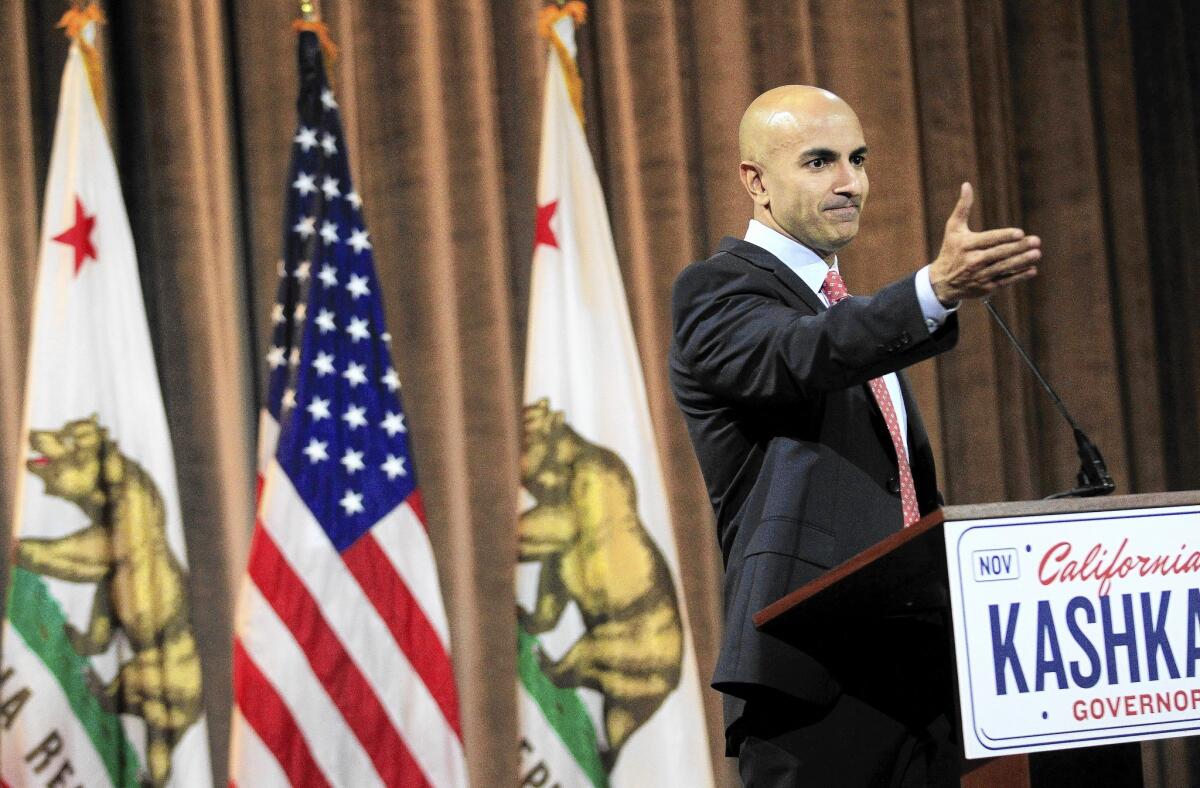Kashkari faces an uphill battle going into November election

- Share via
A day after defeating his scrappy tea party rival in Tuesday’s gubernatorial primary, Republican and Laguna Beach resident Neel Kashkari emerged politically scarred and drained of campaign cash for what his own supporters fear is a futile quest to bounce popular Democrat Jerry Brown from office.
“There’s no question it’s going to be hard,” Kashkari, a first-time candidate for public office, conceded Wednesday at a press conference in Corona del Mar.
It was, by many accounts, an understatement. As the general-election campaign opened, Brown’s strength was reflected in the preliminary results of the primary: The governor finished first, with nearly 55% of the vote; followed by Kashkari, 19%, and Assemblyman Tim Donnelly (R-Twin Peaks), 15%.
Indeed, Republicans looking at the political landscape after the primary were often scornful of Kashkari’s chances. Many speculated that Fresno Mayor Ashley Swearengen, who held a narrow lead among four top candidates for controller, would emerge as the party’s best hope to break a streak of losses in statewide contests dating to 2006.
The governor’s race appeared unlikely to upend recent tradition for two reasons: money and political image.
Kashkari’s shortage of money — he is close to broke after spending about $4 million on the primary, while Brown has banked $21 million — is one of the biggest challenges facing the former Goldman Sachs investment banker.
There’s also his biography: Kashkari gained his first big public notice as leader of the Bush administration’s bank bailout program, a political albatross. And the governor’s political team has already begun portraying Kashkari as a corporate scoundrel, a tactic Brown and his allies used with great effect against eBay mogul Meg Whitman, his GOP rival four years ago.
And while Kashkari holds some moderate positions on social issues — which loyalists have suggested would broaden his appeal — he was forced to move to the right to secure a spot in the general election, a positioning likely to hurt him in November.
Kashkari rejected a longtime GOP formula for success in California: Breaking with the national party on the environment, as Gov. Arnold Schwarzenegger did in his 2006 reelection run with a landmark law to attack global warming. Campaigning in Camarillo on Sunday, Kashkari branded the law “misguided.”
“The notion that an individual state can unilaterally act on climate change is pure folly,” Kashkari said.
On Wednesday, Kashkari vowed to turn the state GOP into “the biggest tent you’ve ever seen in your life,” and he pounded Brown on jobs, education and poverty.
“Jerry Brown’s legacy is the destruction of the middle class of California,” he said.
For now, Brown appears poised to all but ignore Kashkari, focusing instead on the day-to-day duties of governing in the Capitol and reminding Californians that the state is running a surplus after years of chronic deficits.
“The best mode of campaigning for him is to govern the state in a sincere and earnest way, and not even give rise to the notion that there’s a competitive election,” said Don Sipple, a veteran Republican strategist and informal political advisor to Brown.
Indeed, it was no accident that Brown gathered with his cabinet on election night for a working dinner at the historic Governor’s Mansion in Sacramento. With his wife, Anne Gust, at his side, Brown stepped outside afterward and told reporters that his first-place finish in the primary reflected voters’ appreciation of state leaders “living within our means.”
“There’s billions of dollars floating around over at the Capitol,” he said. “We’re going to have to rein that in.”
For a Democrat, Brown performed relatively well Tuesday in Fresno and Orange counties, while running up huge margins around Los Angeles and, especially, the Bay Area. That suggests he has come to occupy a wide swath of the state’s political landscape, denying Kashkari the sort of foothold required by Republicans, the smaller major party.
For Kashkari, one of the dangers ahead is that a perception that he can’t win makes it hard to raise money, which, in turn, makes it harder to win.
“It would take a candidate with strong magnetic personal appeal to overcome the Republican Party’s sagging brand in California and apathy among the electorate,” said Republican campaign strategist Arnold Steinberg. “I don’t see donors stepping up, since Jerry’s election is a near-certainty.”
Some of the big establishment GOP donors who stepped in late to help Kashkari were motivated not by their drive to unseat Brown, but by the damage they feared Donnelly might inflict on the party brand.
Now, those same donors face competing pressure for contributions to Republicans in races where the odds look better as the party tries to retake control of the U.S. Senate, maintain a House majority and block Democrats from locking in a two-thirds supermajority in the California Legislature.
Kashkari also faces trouble on the right. At Donnelly’s election night party in Hollywood, some supporters said they might sit out the November election or write in a candidate, because they see Kashkari as too similar to Brown.
“Might as well vote for Brown,” said William Peck, an 81-year-old Ventura resident who met Donnelly through his involvement in the Minuteman border patrol.
Donnelly himself resisted the idea of asking supporters to back Kashkari.
“I will ask my supporters to fight with every last breath that they have to defend liberty, and the Constitution, and any candidates who represent that,” he said. But he said he would not tell them what to do.
“I’ve never done that,” he said, “and I never will.”
Times staff writers Seema Mehta in Los Angeles and Paige St. John in Sacramento contributed to this report.